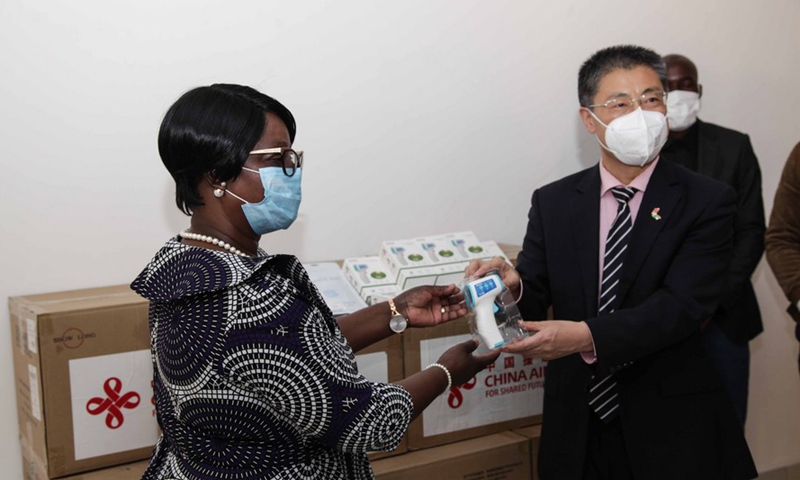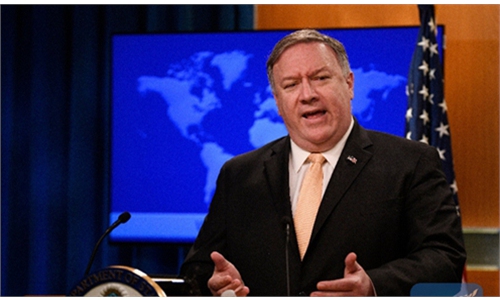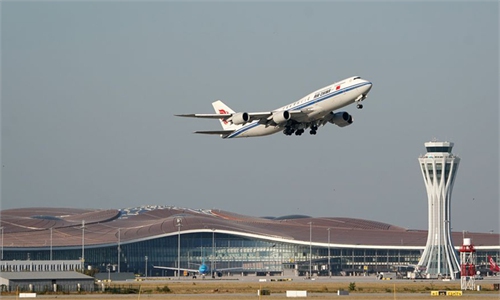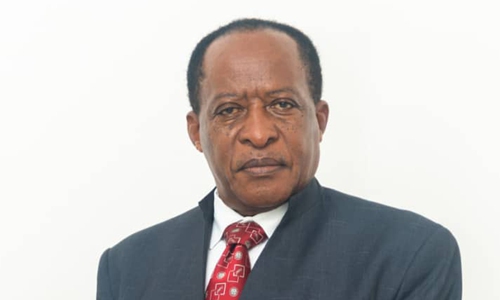
Chinese Ambassador to Zambia Li Jie (right) hands over medical supplies to Zambia's First Lady during the donation ceremony for medical supplies in Lusaka, capital of Zambia, on July 14, 2020. Photo: Xinhua
Editor's Note:
Chinese President Xi Jinping said Monday in a phone conversation with Zambian President Edgar Lungu that the two countries' joint fight against the COVID-19 pandemic is expected to help lift bilateral relations to a higher level and to better benefit the two peoples. The China-proposed Belt and Road Initiative (BRI) in Africa, which was not eased up during the pandemic, has boosted African people's confidence in local medical systems and economic development, said Sande Ngalande (Ngalande), director of the Belt and Road Joint Research Center of the University of Zambia, recently. How is BRI's development in Zambia now? Why are US politicians constantly badmouthing Chinese investment in Africa? Ngalande shared his views with the Global Times (GT) in a written interview.
GT: Among all the BRI programs in Zambia, which is the most popular one among local people? With bilateral cooperation under the framework of the BRI in the post-pandemic era, which project do you expect the most?
Ngalande: It is said that Zambia has been turned into a large construction site. I have traveled the width and breadth of Zambia. As you travel, you see in both rural and urban areas huge construction projects in various economic sectors including, among others, road networks, highways, bridges, schools, hospitals, telecommunication installations, airports, dams, government office buildings and housing projects. Almost all of these projects are synonymous with Chinese works under the BRI.
In the recent past, especially this decade, the face of Zambia has significantly changed. People who have spent several years out of the country almost fail to recognize the areas they used to live in because of the fast pace at which the cities have changed. True to the Chinese saying, "If you want to become rich, build roads first." Zambia's vision for turning into a prosperous middle-income country by 2030 is close to being achieved because of the direct benefits of the BRI infrastructure projects, especially in road construction. Many Zambian people are happy, hopeful, and eagerly waiting for the good results of the vast road network projects being carried out by the Chinese government and its people in Zambia.
These projects have laid a strong foundation for further investment in education and health sectors. It is hopeful that the BRI will focus more on education and health as part of the strengthening of people-to-people exchanges. It is therefore gratifying that President Xi Jinping has promised to support and strengthen the Africa Centres for Disease Control and Prevention while continuing the implementation of the BRI projects.
GT: US Secretary of State Mike Pompeo recently attacked China-Africa ties by accusing China when it offered assistance to Africa. Pompeo said, "It's always in exchange for something." But when the US does it, it is the "right thing." How do you view Pompeo's statement? What do you think are the differences between assistance from China and assistance from the US?
Ngalande: It is China that has a clean record in Africa. The long-standing friendship between China and Africa dates back 600 years to the legendary expeditions of Chinese navigator Zheng He, whose fleet reached East African shores four times. Zheng He, one of the most admired diplomats of the Ming Dynasty (1368-1644), carried important voyages that have not been well celebrated in history books, especially outside of China. Zheng He provides a great window into China's thinking about its engagement with Africa for as long as China has known Africa. The West is aware that China has never taken advantage of its economic advantage against Africa. Zheng He dealt with African leaders on the basis of equality, engaged in trade and ultimately left African states and societies alone and intact.
In Zambia, the monument of China-Africa relations is embedded in the TAZARA Railway built in the 1970s as a gift from the Chinese people. This was one of the biggest projects China had ever undertaken at the time when China was extremely poor and hardly able to manage such a project out of China. Africans are very aware therefore that the relations with China have always grown from strength to strength and there is nothing unusual about China's aid to Africa. Africa would have every reason to question the motivation of gifts from the West because there is a history of colonialism. Unlike the West's aid, China's does not come to Africa with preconditions. It is rather based on win-win, mutually beneficial engagements between all-weather friends.
GT: China and Africa have cooperated closely during the ongoing pandemic. Are there any cases (events) on bilateral cooperation in the fight against the virus that impresses you the most? What role do you think the US has played in the COVID-19 pandemic?
Ngalande: Compared to China, the US plays a rather unclear and uninspiring role in the fight against COVID-19. Confusing statements have always emerged out of Washington from praising China to criticizing China's handling of the pandemic, and China's relations with the World Health Organization (WHO). Initially and after China sent a timely and clear warning to the world through the WHO about the wrath of COVID-19, the US thought China overstepped her actions and applied draconian rules. No sooner than China had shown leadership in containing COVID-19 than the US began struggling with the management of the virus that has claimed hundreds of thousands of lives in the US alone.
Africa has seen fighting COVID-19 as a reaffirmation of the all-weather ties between China and Africa. As soon as ugly images of the attack on China over COVID-19 began emerging, Africa poured numerous messages of solidarity into China from both ordinary people and government leaders including heads of state. Immediately after cases of COVID-19 began announcing in Africa, the Chinese missions in Africa, Chinese companies and businesses, Chinese prominent people like Jack Ma Yun and ordinary Chinese people living in Africa mobilized various kinds of resources to help Africa fight the pandemic.
Chinese hospitals and medical universities have held numerous webinars with their African counterparts to share positive experiences from China in fighting the virus. President Xi has held several virtual meetings with African leaders including the Extraordinary China-Africa Summit on Solidarity against COVID-19 in June 2020, which was a great boost to Africa's fight against this scourge. It was at this summit that President Xi, cognizant of the great economic stress this deadly disease had brought on Africa, announced that China would cancel the debt of relevant African countries in the form of interest-free government loans that were due to mature by the end of 2020. In Africa, ordinary Chinese citizens have worked side-by-side with African nationals to fight and prevent COVID-19 in various ways.
GT: Some Western media outlets tend to hype up "anti-China sentiment" in Zambia. They quote local people claiming that the "Chinese have deprived us of our jobs," and so on. Is that individual phenomenon or the mainstream Zambian attitude toward China? How do the majority of Zambian people view China's investment and programs in the country?
Ngalande: First of all, nothing can be further from the truth than accusing China of buying Zambia. It is just absurd. Zambia stands out as one of the best examples of fruitful, mutually beneficial cooperation between China and Africa. Clearly, the West does not in any way want to see any good story to emerge out of this engagement. Since the 1990s, China's investment in Africa in general and Zambia in particular have grown from dozens of millions of US dollars to billions of US dollars - especially since the new Zambian government came into power in 2011. Millions of jobs have been created through China's investments by both Chinese state-owned enterprises and Chinese private businesses.
Generally, Zambian people are grateful to the Chinese government and the Chinese people for helping Zambia to get onto an accelerated path to economic development and for poverty reduction through massive infrastructure projects and subsequent job creation. Thousands of Chinese people are doing business in Zambia creating jobs for local people and paying taxes to the Zambian government. Naturally, isolated instances of conflict due to different laws, language and culture do happen just like in any other country in the world. But these have always been resolved amicably and in a friendly manner.
China has never imposed conditions on the debt that Zambia has accrued. While the West stated that Zambia had accrued so much debt from China that it had lost its sovereignty to China, China has, in the face of COVID-19, announced the cancellation of some of these debts and promised to restructure some loans. There has never been any report of Zambia being made to pay through the nose or being held at ransom because of the debt to China. On the contrary, Zambia-China relations are not under threat, but are on a promising trajectory to create a prosperous middle-income nation.
GT: The death of George Floyd in the US triggered Black Lives Matter protests across the world. What is Africa's mainstream stance over the incident? How do you comment on the status quo of racism in the US? What role do you think the incident of Floyd plays in US-Africa ties?
Ngalande: There is a Zambian saying that goes, "Once you point a finger at another, four other fingers are pointing at yourself." The US has always presented itself as the "role model" on human rights and democratic governance in a manner that erroneously makes the world feel the US has resolved all governance issues within herself. The George Floyd case was a time bomb that had been ignored for a long time.
From enduring and fighting slavery over a long time, African communities in the US have suffered some of the worst forms of racism. Rather than deal with these issues at home, the US chose to engage the globe as a "role model."
The George Floyd case has given a couple of lessons. First, the ugly face of racism is alive and far from being resolved in the US. Second, racism had been neglected by the political leadership for a long time. Third, the US is far from dealing with inequalities in its own society. Lastly, the world is telling the US, "Solve your racial, inequality and human rights problems before you go preaching moral values to others." The George Floyd case questions the nature and existence of mutually beneficial relations between Africa and the US if the two races are not considered equal.



